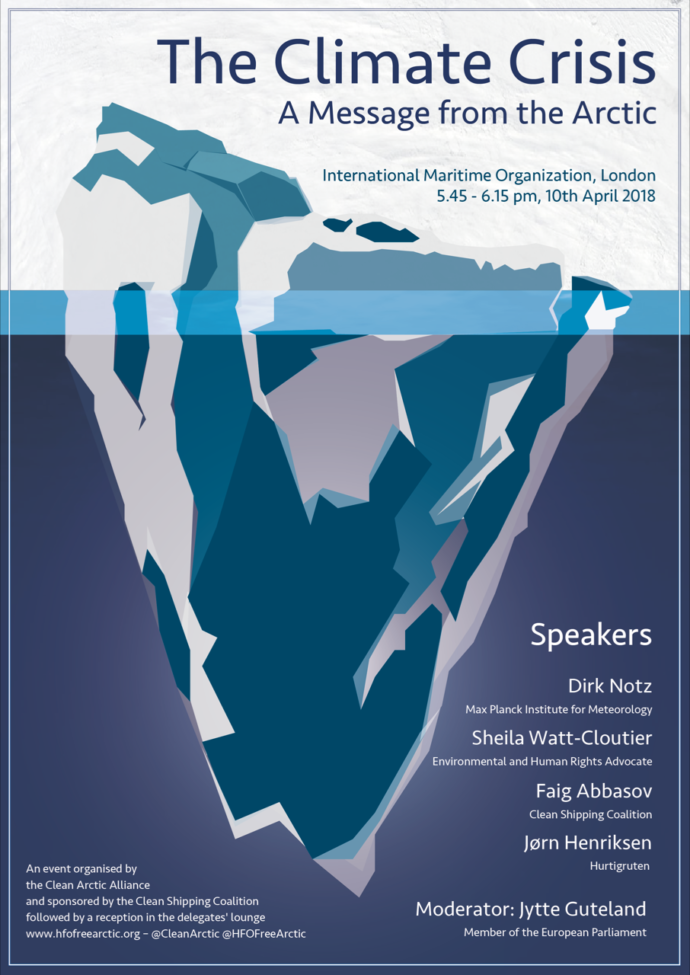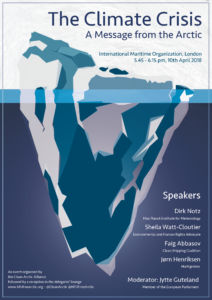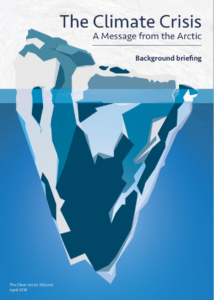The Climate Crisis: A Message from the Arctic
The Clean Arctic Alliance is organising a side-event at MEPC72 on Tuesday, 10 April at 1745: The Climate Crisis: A message from the Arctic. The aim is to increase awareness among IMO delegates about the local and global consequences of the current changes taking place in the Arctic, and to demonstrate the necessity for IMO to agree an ambitious strategy to reduce greenhouse gases from shipping globally and a regional ban on HFO in the Arctic.
The event will consist of a panel presentation involving four short 5-7 minute presentations followed by a reception – but check the brochure and the briefing, which contain much more information, including quotes from the speakers:
- Science: Dirk Notz, Max Planck Institute for Meteorology
- Indigenous voice: Sheila Watt-Cloutier, Environmental, Cultural and Human Rights Advocate
- Shipping industry: Jørn Henriksen, Hurtigruten
- Non-governmental: Faig Abbasov, Transport & Environment and Clean Shipping Coalition
The event will be moderated by Jytte Guteland, Member of the European Parliament.
The Climate Crisis: A Message from the Arctic – event brochure (pdf)
Briefing: The Climate Crisis: A Message from the Arctic (pdf)
Update:
The speech made by Sheila Watt-Cloutier during the event
INTERNATIONAL MARITIME ORGANIZATION: LONDON, ENGLAND, PANEL DISCUSSION- APRIL 10, 2018-04-10
Nakurmiik,
First I would like to thank the Clean Arctic Alliance for organizing this event and inviting me here to share the human side of the Climate Change issues.
I would like to share with you not only what is happening to our communities in the Arctic but what it means to Inuit and to us all in this room and beyond.
The world has come to know the wildlife of the Arctic more then it’s people. Much of it because of large companies who market their product using wildlife in a romanticized way and the way in which misguided animal rights movements have put the protection of wildlife before the understanding and respect of the impacts of those movements on its people.
The Arctic has become an important place for global policy makers, researchers and companies who now seek more of the rich resources which are becoming more accessible due to the ice melt. But this interest has to be better informed by the awareness of what his happening to the largely Indigenous and subsistence oriented communities which provide the human face to the Arctic.
Many of our communities are small and they do not necessarily always have great political power or influence at national and international levels but they are the heart and soul of the Arctic.
Many of you over the decades have heard me speak about the importance of the Inuit hunting culture. Hunting is not just about the harvesting of animals but equally as important it is about training our youth the character skills such as patience, endurance, persistence, courage, resiliency, sound judgment and ultimately wisdom. This holistic approach of teaching our children for the challenges and opportunities of life are the hallmark of Inuit culture. These skills along with the technical skills of learning how to be a natural conservationist and a good provider for your family are very transferable to the modern setting we are now in. In fact, with what your youth are going through and the high suicide rates we are facing, these skills are a requirement to help overcome obstacles and challenges.
However, this wisdom which is often sourced from the land and ice is now equally at stake of being lost as the ice itself. The ice is our life force, the ice is our University, the ice is our supermarket for highly nutritious food, the ice is about the health and well being of an entire people who live at the top of world who have already gone through many historical traumas and who now face the possibility of even more vulnerable situations. It is not only about polar bears, it is about families and communities.
These challenges we face are not of our doing. We have benefited the least from industry and yet we are one of the most disproportionately negatively impacted by the effects of globalization. How ironic and sad that a people who have lived sustainably for millennia and far from the source of pollutants and greenhouse gases would bear the brunt of their damaging effects.
For too long we have asked the world to stop hurting our way of life, and for too long the world has responded that it is too expensive to stop bringing harm to your way of life. Inuit and other vulnerable peoples are being asked to pay the price for the unsustainable choices most of the world continues to want to maintain. Inuit and others are becoming the collateral damage as a result of irresponsible political actions….or inactions.
Everyone benefits from a frozen Arctic and that everything is connected and we can no longer separate the importance and value of the Arctic from the sustainable growth of economies around the world.
Everything is connected through our common atmosphere, not to mention our common spirit and humanity. What affects another, affects us all. We know that as the Arctic melts, other places such as the Small Island Developing States are sinking.
In the International arenas, where I have personally been involved, the language of economics and technology is always calling for more delays. We are constantly reminded how taking action on greenhouse gas emissions will negatively impact our economy. I understand this same lame excuse which is a very outdated card to play at this stage with our climate crisis, I would say do not play this card when it comes to banning Heavy Fuel Oil which has potential to create extreme irreparable damage to our Arctic oceans…and I repeat the Oceans are the life force and source of life for us as Inuit of the Arctic.
Instead we must now be thinking about and reframing all these issues in terms of fundamental human rights. This approach of focusing climate change solely to economics tends to ‘silo’ or separate the issues from one another, as opposed to recognizing the connections between rights, environment, health, economies and society.
In closing, what I am about to say, I would like for it to be your biggest take away from my very short talk here.
In the Arctic, the constant state of emergency has become the norm, leaving a huge psychological impact on our communities. We are still reeling from the first wave of tumultuous changes and the Intergenerational historical traumas brought on by colonialism. As we better understand these histories of suppression and oppression and try to move beyond them, we now face another trauma to our world: Climate Change.
A history of this violence now mirrors the violence we are inflicting upon our planet. I understand the economy is volatile but growing the economy in the same unsustainable way causes irreparable damage to the atmosphere and it’s forcing the planet to react with violent storms and other erratic events. This is not unlike the Inuit or Indigenous and vulnerable children of the world who suffered trauma and without care, a space to heal and effective coping mechanisms, then self- destructive behaviour is inevitable. What we are seeing in our communities and in our atmosphere are not abnormal behaviours. What we are seeing are perfectly normal reactions to extremely abnormal circumstances. Human trauma and Planet trauma are one of the same.
We can’t think our way through this. We have tried politics, economics and technology. It hasn’t worked.
You know what you need to do in this room. IMO and everyone involved, it’s urgent. It’s a human issue, a human rights issue, and the wisdom and solutions lie within us. Together we can do this.
Download: The speech made by Sheila Watt-Cloutier during the event



